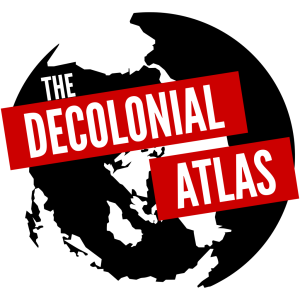
Edit: This map has been updated. You can find the new version here.
Anishinaabemowin (Ojibwe) is the most-spoken indigenous language in the Great Lakes basin. Charles Lippert, a speaker of Anishinaabemowin, has helped tremendously by researching the lakes and translating into Anishinaabemowin. Below are the translations for all the Great Lakes:
Nayaano-nibiimaang Gichigamiin: The Great Lakes (The Five Freshwater Seas)
Anishinaabewi-gichigami: Lake Superior (Anishinaabe’s Sea)
Ininwewi-gichigami: Lake Michigan (Illinois’ Sea)
Naadowewi-gichigami: Lake Huron (Iroquois’ Sea), also known as Gichi-aazhoogami-gichigami (Great Crosswaters Sea)
Waabishkiigoo-gichigami: Lake Erie (Neutral’s Sea), also known as Aanikegamaa-gichigami (Chain of Lakes Sea)
Niigaani-gichigami: Lake Ontario (Leading Sea), also known as Gichi-zaaga’igan (Big Lake)
Gichigami (Sea) literally means “big (gichi) liquid (-gami)”. Gichigami can also refer to the Saltwater / Bitterwater Sea (i.e. ocean) — zhiiwitaagani-gichigami
The St. Louis River (MN / WI), St. Mary’s River (ON / MI), St. Claire River (ON / MI), Niagara River (ON / NY) and the St. Lawrence River (QC / ON) are all called Gichigami-ziibi (Sea River), as they all drain into or out of a Great Lake.
*A note on the compass – The Anishinaabe traditionally orient themselves to the East. Because the standard orientation is different in European and Anishinaabe cultures, we’ve included the English word “North” and the Anishinaabemowin word “Waabang,” meaning East, on the compass. The compass rose itself is in the form of a medicine wheel, an indigenous symbol used across the continent to denote the four directions.
Map: Jordan Engel. As always, the Decolonial Atlas’ original media can be reused under the Decolonial Media License 0.1.

[…] and why now? Toronto’s riverine legacy stems from glacial ice sheets feeding into the ancient Niigaani-gichigami (Lake Ontario). These lands have been cherished by Indigenous Peoples for thousands of years. […]
LikeLike
I would love to see if any of the tribes can find out who the Whittlesey Culture was. We thought the Ohio shore of Lake Erie belonged to the Erie when whites arrived, for hundreds of years, but recent archaeology seems to show an Algonquian people who lived in longhouses & had adopted elements of Fort Ancient & Iroquoian culture into their own.
LikeLike
[…] The need to connect back to Indigenous histories is another important lens for BSAM Canada’s Earthseeds project. Andréa Williams, a Black Indigenous community educator and activist, encouraged guests to understand the interconnectedness of Black and Indigenous histories. Work needs to be made in acknowledging the land and traditional name of Lake Ontario Niigaani-gichigami. […]
LikeLike
[…] * I read that Oniatarí:i (“Beautiful Lake”) is one of several Mohawk names to reference Lake Ontario. And that in Ojibwe, this water body is referred to as Niigaani-gichigami (“Leading Sea”), and Gichi-zaaga’igan (“Big Lake”). Let us acknowledge all the names that have been lost to colonialism and also the knowledge keepers. Check out these sources for more info: 1, 2, 3, 4. […]
LikeLike
CHII MIIGWECHES A’HO MIGIZI IKWE
LikeLike
[…] am currently sitting beside Lake Erie (Erielhonan), or in Ojibwe, Waabishkiigoo-gichigami (Neutrals’ Sea), or Aanikegamaa-gichigami (Chain of Lakes […]
LikeLike
I’ve always been mystified by the Great lakes , would love more info when it”s available . Please & Thank-You !!!! xo.
LikeLike
[…] resource I often use is the Decolonial Atlas. The blog has an entry called The Great Lakes in Ojibwe that shares the Anishinaabemowin (Ojibwe) names for the Great Lakes, as it “is the […]
LikeLike
[…] The Decolonial Atlas names the Great Lakes in Ojibway. […]
LikeLike
[…] Source: The Great Lakes in Ojibwe […]
LikeLike
[…] Source: The Great Lakes in Ojibwe […]
LikeLike
[…] Source: The Great Lakes in Ojibwe […]
LikeLike
I’m very please with this for our future children . Love the language of first.
LikeLike
Ojibwe is only one dialect of the Anishinaabemowin language. I hope everyone realizes that there are three nations of the Anishinaabe – Odawa, Ojibwe and Pottawattami. Lake Huron was called Odawa M’Niss from time immemorial because it was the territory of the Odawa as guardians. The Ojibwe may have had names for these lakes but that is only the Ojibwe perspective.
LikeLiked by 1 person
Reblogged this on ThumbWind and commented:
Amazing naming for the Great Lakes. The Ojibwa language is much more descriptive.
LikeLike
This is worth a reblog for sure. Nice work.
LikeLike
Great stuff…thanks for posting for the group
LikeLike
Double-down on non-colonialism, make East be up.
LikeLike
Reblogged this on Urban Meliad and commented:
Useful Information
LikeLike